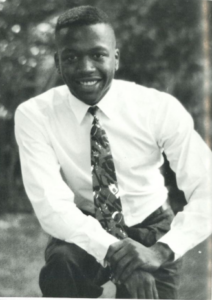Peter Matthews ’91
I was a 5-year-old who had severe motor difficulties, and my mother made a calculated decision that Seven Hills would provide a better opportunity for me with small class sizes so that I would get the attention I needed. I started at Lotspeich in kindergarten.
I remember former Lotspeich teacher Margaret Vitz teaching me to read. I remember going to Camp Kern in the fourth grade and the trust exercises that we did there. The fact that as young people we had an opportunity to explore the emotional side of learning in preparation for school — in retrospect, that’s mind-blowing to me now. Who gets to do that? I remember playing soccer, and some of my best friends and teammates were Daam Barker, Doonam Kim, and Robert Gilson, whose families had roots around the world. It was as if I was reared in a mini-United Nations.

By Upper School, my main sport was basketball, and as a freshman starting on the varsity team, Former Athletic Director Duke Synder was my coach all four years. My stepfather was a janitor at Children’s Hospital for 38 years and he raised me to have a relentless determination, but Duke truly was also a father figure to me. We spent an innumerable amount of hours in the gym together, working on moves and talking about life. We’d be there together before anybody else came and still be there after everybody else left. The fact that Duke was there so consistently for me taught me — and still reminds me — how important it is to show up for people.
When I was inducted into the Seven Hills Athletic Hall of Fame, that’s what I was thinking about — all those times at the gym when it was just Duke and me. At the same ceremony, Shaun Whitehead was inducted, and he talked about his mother driving him back and forth and how important Seven Hills was in providing for him. I just lost it; I cried uncontrollably. It had me thinking about Seven Hills as this incredible vehicle of social mobility that a lot of people never get.

Duke was one of the giants for me, but there were so many others. I actually came very close to leaving sports because I was so infatuated with Patty Flannigan and inspired by her candor and her authenticity. After my junior year, I studied “Othello” as a summer project, and Patty helped me get inside Othello’s head, as much as I could as a 17-year-old. I just recently took my wife to see “Macbeth,” and here we are more than 30 years later, and I was thinking about Patty while I was watching the play.
Patty’s thing was being fully present to who you are. It was a joy to be around someone who would celebrate your idiosyncrasies and who lived with such passion. She would also have deep conversations with me about race at a time when that wasn’t really happening in the school. Barbara Beaver was another one. Barbara was the faculty advisor to the Upper School Minority Awareness Club when I was the club’s president, and she’s never gotten enough credit for how she heard and supported students of color throughout her tenure at Seven Hills.
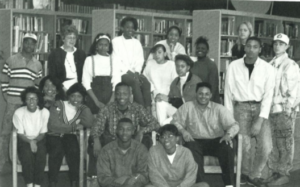
But overall, there was a sense at the time that there was supposed to be color blindness. Even as we’d read Toni Morrison or Ralph Ellison in school, there was still that color blindness. The school didn’t really want to grapple with issues of race, but it still hung in the air.
My last two years at Seven Hills, I was thinking a lot more about what it means to be a Black man in America and what is my responsibility and commitment to persons of color around the world. My junior and senior year, my best friends at the school were Harold and James and all the other janitors. I’d see them between classes and talk to them constantly throughout the day. Knowing Harold was there was a constant reinforcement that someone was watching out for me. Years later, it was Harold who was waiting for me outside of the auditorium when I received my alumni award, just as he’d be outside the gym after a Friday night basketball game when I was a student. I offered that alumni award to him, but he wouldn’t take it. Just like Duke, Harold reminded me of the power of showing up.
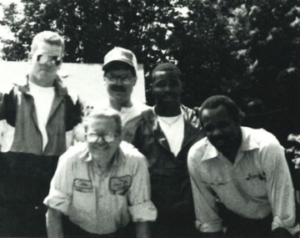
Before our graduation ceremony senior year, I huddled with the janitors in a private space where we all prayed together. After the ceremony, James reached into his pocket and pulled out $50 to give me. His hands had cuts and calluses upon calluses on them. He said to me, “I never want your hands to look like mine.” I didn’t know what to say, so I said, “I promise.” I have never forgotten him, that promise, or that day.
All of these relationships are still feeding me. It wasn’t until I hit my 40s that I think I fully appreciated how profoundly Seven Hills has shaped my life. I had started getting letters from college basketball programs starting in ninth grade. At the same time, I was almost failing out of Seven Hills and needed to go on academic probation. So, I’m failing out, but I was so arrogant that I’m still focusing on these basketball letters. I knock on Susan Marrs’ door, and she started helping me see things more clearly, to see college as a place with sports but also to see college as a place to learn. She asked me about my interests and talked to me about what opportunities there could be after college.
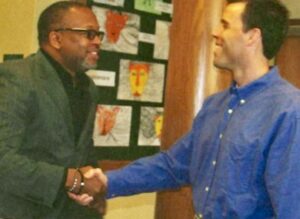
We started meeting twice a month and did that for the next four years. What’s the cost per hour for someone like Susan Marrs to be invested in my life twice a month for four years? Without her, there is no way that I would have heard of Denison University, where I attended college. I would have ended up at some junior college. The college preparedness at Seven Hills alone takes the cake and provided me with a social and emotional skillset that to this day — along with the assistance of another Seven Hills parent, my psychologist, Dr. Carl Crew, Jr. — allows me to participate in my own healing.

I had some issues with being Black at Seven Hills and not immediately reconciling where I was with where I came from.
And yet, my social worker mother and my janitor stepdaddy, alongside this remarkable school, worked patiently with me to put the pieces of my life together and let me experience the world. I’ve now been on the phone with Susan Marrs in four different continents! I always refer to her as my white mother, and it all started because I was this self-absorbed ninth grader who she helped put on the right track. Jack White took me aside when I graduated, and thinking about all my detentions freshman year, he told me it was the biggest turnaround of anyone he remembered. I often tell people that I peaked in high school, but it was those moments alongside those people that have made this magical descent one hell of a ride.
